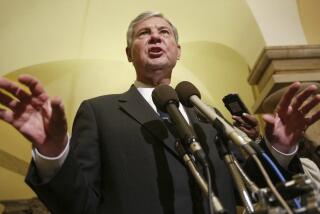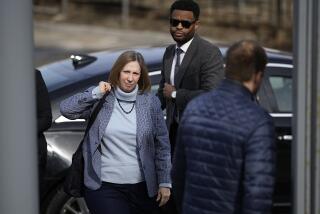PASSINGS: Yelizaveta Mukasei, Don Yarborough, Sam Carr, Caro Jones, Keith Floyd, William Garvey, W. Horace Carter
Yelizaveta Mukasei
Soviet spy was based in L.A. in ‘40s
Lt. Col. Yelizaveta Mukasei, 97, a Soviet spy who worked undercover in the West with her husband, died in Moscow early Saturday, according to Russian External Intelligence Service spokesman Sergei Ivanov.
Few details of her life have been made public by Russian authorities, but an obituary issued by the spy agency said Mukasei, whose code name was Elza, lived in Los Angeles from 1939 to 1943 when she and her husband, Mikhail, were working undercover here.
Born in 1912 in the southern Russian city of Ufa, Mukasei attended Leningrad University. She married Mikhail in 1934, and the couple were sent to California with their two children.
According to a 2009 report on Russian Channel One Europe TV, Mukasei was a radio operator who transmitted information that her husband gathered while working at the Soviet embassy.
The couple returned to the Soviet Union in the mid-1940s and received more training. Mukasei studied German, Polish and coding and worked as a secretary for a Moscow theater. The couple went back abroad and worked as spies from 1955 to 1977 in unidentified countries.
Later, after returning again to the Soviet Union, Mukasei helped train spies and wrote textbooks on spying. She was awarded several state medals.
Her husband Mikhail, whose code name was Zephyr, died last year at 101.
Don Yarborough
His run brought JFK to Texas
Don Yarborough, 83, who was a three-time gubernatorial candidate in Texas during the 1960s and whose challenge to incumbent Gov. John B. Connally was one of the reasons President Kennedy decided to make a swing through Texas in November 1963, died Wednesday at his home in Houston of complications from Parkinson’s disease.
Yarborough was born in New Orleans in 1925. He served in the Marine Corps at the close of World War II and received his law degree from the University of Texas at Austin in 1950.
A liberal Democrat, Yarborough first ran for lieutenant governor in 1960, then made his first run for governor in 1962 against three-time incumbent Price Daniel and John Connally. Connally won.
Vice President Lyndon B. Johnson, himself a Texan, was concerned that Yarborough might defeat Connally in 1964 and that his liberal views would drive conservatives into the Republican fold, thus jeopardizing Kennedy’s reelection chances in 1964. Johnson convinced Kennedy that a presidential visit to Texas would help unite the famously fractious party.
When Connally was shot while riding in the car with the president -- who was assassinated -- in Dallas, he became a national hero, and he easily defeated his liberal challenger. After losing another governor’s race in 1968, Yarborough retired from politics.
Yarborough moved to Washington and was a lobbyist for a group advocating medical treatment for spinal cord injuries. He also supported efforts to cure aging, which he believed was simply a disease like any other. He returned to Houston in 1981.
Sam Carr
Drummer known for Delta blues
Sam Carr, 83, a drummer who was considered an anchor in the blues scene that continues to draw fans to the poverty-stricken Mississippi Delta region where the music form was born, died Monday of congestive heart failure at a nursing home in Clarksdale, Miss.
Carr had a reputation as one of the best blues drummers in the country and, at one time or another, had backed big names including Sonny Boy Williamson II and Buddy Guy.
Carr’s father was 1930s blues guitarist and vocalist Robert Nighthawk, who made “Sweet Black Angel” famous. Early in his career, Carr often played with his father.
Carr was born Samuel Lee McCollum in 1926 near Marvell, Ark. His name was changed after he was adopted as a toddler by a Mississippi family with a farm near Dundee, according to a biography written by Scott Barretta, a blues professor at the University of Mississippi.
He moved back to Arkansas at 16 and collected money at the door of clubs where his father performed. He worked as a sharecropper before turning his full attention to the blues, moving to St. Louis and playing bass with harmonica player Tree Top Slim.
He returned to Mississippi in the early 1960s and formed the Jellyroll Kings, a three-piece Delta blues band featuring Big Jack Johnson on guitar and Frank Frost on harmonica and keyboard.
Caro Jones, a longtime casting director whose credits in film, TV and stage include the Oscar best picture winner “Rocky,” died Sept. 3 in Los Angeles of multiple myeloma, her family announced. She was 86.
Keith Floyd, a flamboyant chef who became a TV star in Britain with his shows “Floyd on Fish” and “Floyd on France,” died Sept. 14 of a heart attack in Bridport, England. Floyd, who also had bowel cancer, was 65.
William Garvey, a songwriter whose “Goodbye Horses,” performed by Q Lazzarus, was featured in the 1991 film “The Silence of the Lambs,” died of heart failure Aug. 3 at a hospital in Cleveland, his family announced. He was 51.
W. Horace Carter, a North Carolina newspaper publisher and editor for the Tabor City Tribune and the Whiteville News Reporter whose crusades against the Ku Klux Klan in the 1950s earned him a Pulitzer Prize in 1953, died Sept. 16 in North Carolina after a heart attack. He was 88.
-- times staff and wire reports
More to Read
Start your day right
Sign up for Essential California for the L.A. Times biggest news, features and recommendations in your inbox six days a week.
You may occasionally receive promotional content from the Los Angeles Times.






